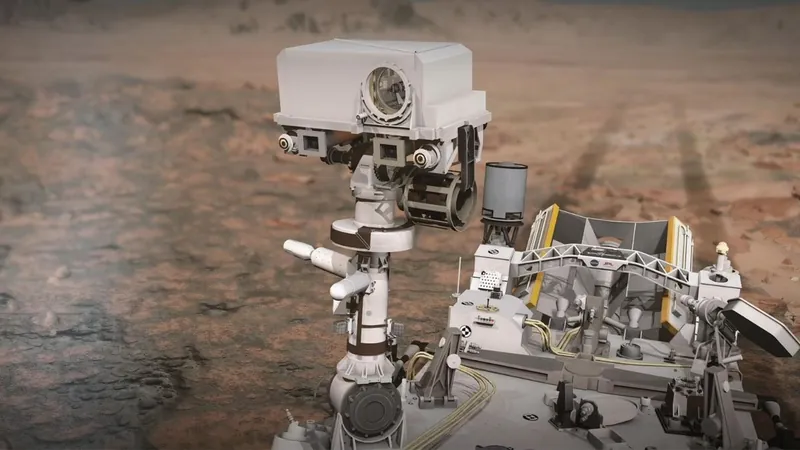
NASA's Perseverance Rover Sparks Controversy: Did It Uncover Evidence of Life on Mars or Just Misinterpret It?
2024-11-20
Author: Jia
NASA's Mars Mission and the Discovery of Organics
In a groundbreaking quest to determine whether life ever existed beyond Earth, NASA's Perseverance rover detected what might be carbon-based molecules known as organics on Mars. This find has ignited excitement and intrigue among scientists and the public alike, propelling discussions about potential ancient extraterrestrial life.
Skepticism in the Scientific Community
However, some voices within the scientific community express skepticism, asserting that the data collected by the rover may not definitively support the existence of organic molecules. The high-powered instruments used by Perseverance, while sophisticated, are not on par with the capabilities of Earth-based laboratories, leading to uncertainties regarding the findings.
SHERLOC Instrument and Its Role
Perseverance's integral tool in this exploration is the SHERLOC (Scanning Habitable Environments with Raman and Luminescence for Organics and Chemicals) instrument, crafted explicitly to detect organic materials. Ken Farley, the project scientist, explained that SHERLOC combines two techniques: deep ultraviolet luminescence and Raman spectroscopy, which together aim to identify potential organic compounds on the Martian surface.
The Ambiguity of Luminescence
Luminescence, while capable of producing strong signals when organic molecules are present, is ambiguous because it can originate from other non-organic sources. This leads to concerns about false positives, as emphasized by Farley. 'Many things luminesce; it's related to subtle characteristics of the chemical materials,' he noted.
The Excitement of Jezero Crater
The excitement surrounding the discovery stems from Mars' Jezero Crater, a former lake thought to be 3.5 billion years old, akin to ancient Earth environments rich in signs of life. Initial reports suggested that the rover's luminescent signals indicated a variety of aromatic molecules, adding fuel to the possibility of ancient microbial life having existed on Mars.
Alternative Explanations
Nevertheless, some researchers propose an alternative explanation: the signals may arise from inorganic materials, such as cesium ions found in minerals formed by ancient magma flows. Eva Scheller, a planetary scientist from MIT, highlighted the challenge of interpreting spectral data, referencing the term 'degeneracy,' where multiple chemicals generate similar results, complicating accurate conclusions.
Challenges of Mars Exploration
The stakes are high for the Perseverance mission, as scientists contend with an array of interpretations and the inherent uncertainties of Mars exploration. Conditions on the Martian surface complicate the effectiveness of instruments, and grounding analyses similar to what is feasible on Earth is nearly impossible.
Need for Sample Return Mission
Notably, the push for a sample return mission remains paramount, as it would enable closer inspection of any detected organics to ascertain their origins. While finding organic molecules is exciting, both Farley and Scheller stress that such findings do not confirm the presence of life — it merely raises the intriguing possibility.
Scientific Discourse and Ongoing Research
Science thrives on debate and scrutiny, and in this case, it's crucial to objectively assess findings without jumping to conclusions. Farley remarked on the nature of scientific discourse, stating, 'This is error correction, and it’s the way the scientific process has to work.' The pursuit of knowledge continues, keeping humanity's age-old question of life beyond Earth alive as we delve deeper into the mysteries of Mars.
Looking Ahead
As we await more data from Perseverance, one thing is certain: the search for extraterrestrial life will only intensify, and every ambiguous signal could hold profound implications for our understanding of life beyond our planet. The excitement continues, but so does the scrutiny. Will Mars finally reveal its secrets? Stay tuned!


 Brasil (PT)
Brasil (PT)
 Canada (EN)
Canada (EN)
 Chile (ES)
Chile (ES)
 España (ES)
España (ES)
 France (FR)
France (FR)
 Hong Kong (EN)
Hong Kong (EN)
 Italia (IT)
Italia (IT)
 日本 (JA)
日本 (JA)
 Magyarország (HU)
Magyarország (HU)
 Norge (NO)
Norge (NO)
 Polska (PL)
Polska (PL)
 Schweiz (DE)
Schweiz (DE)
 Singapore (EN)
Singapore (EN)
 Sverige (SV)
Sverige (SV)
 Suomi (FI)
Suomi (FI)
 Türkiye (TR)
Türkiye (TR)